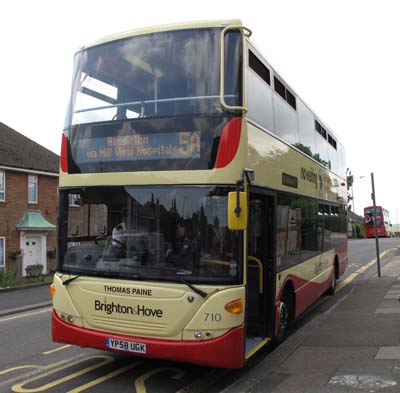
Names on the buses
710 Thomas Paine
710 Thomas Paine
Names on the buses
Connections with Brighton and Hove : Thomas Paine, who spent several years of his life in Lewes, took part in both the American and French revolutions. His pamphlet, Common Sense had a big effect in America as he advocated independence for the colonies from Britain. In France, he was elected to the national convention in 1792 and his widely acclaimed book The Rights of Man, influenced the French people. Born in Thetford, Norfolk in 1737, Paine had a variety of jobs before being appointed an excise officer. In 1768 he moved to Lewes and lived in a room above the 15th-century Bull House, a building which contained the snuff and tobacco shop of Samuel and Esther Ollive. Samuel Ollive introduced him to the Society of Twelve, a local elite group that met twice a year to discuss town issues. Paine also took part in the Vestry, an influential church group that collected taxes to give them to poor people. In 1771 he married Elizabeth, daughter of his landlord. Paine was dismissed from the excise service for being absent from his post without permission in 1774 after he had spent time agitating. The tobacco shop failed as well. He paid of his debts, separated from his wife, and moved to America that same year. His book The Age of Reason, which argued against some Christian doctrines, made him a notorious figure. He was arrested in Paris in 1793 and sent to prison but was released the following year. Paine disliked Napoleon’s dictatorial methods and called him a charlatan. Paine went back to America in 1802 when invited to do so by President Thomas Jefferson, an old friend. He died in New York aged 72 in 1809 and was buried there.




710 Scania Omnicity - carried name since delivery in January 2009. Repainted into standard livery July 2013. Bus sold in June 2018.